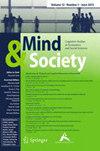COVID-19大流行期间的妇女健康
Q1 Arts and Humanities
引用次数: 0
摘要
COVID-19大流行以怀疑的态度折磨着人类的各个方面。研究它对妇女的影响是有意义的,这些妇女非常努力地工作,承担所有的家庭责任,承担巨大的心理和家庭挑战,以保护家庭。本研究调查了第二波COVID-19大流行期间女性的身体、精神和生殖健康问题。从印度北方邦桑德拉尔爵士医院的妇产科和BHU医学研究所招募了50名年龄在21岁至50岁之间的妇女。身体健康问卷(Schat, Aaron & Kelloway, Kevin & Desmarais, Serge, 2005)、一般健康问卷(Goldberg & Hillier, 1979)和生殖健康问卷(Eadie & Runtz, 2007)分别用于测量身体健康、心理健康和生殖健康。总的来说,妇女经历了身体、精神和生殖健康问题。调查结果显示,已婚妇女和未婚妇女、工作妇女和非工作妇女在身体健康方面存在显著差异,核心家庭妇女和联合家庭妇女在生殖健康方面存在显著差异。妇女生殖健康与身心健康显著正相关,心理健康与身体健康也显著正相关。无论社会经济阶层如何,COVID-19大流行都对妇女的健康产生了重大影响。她们面临着更大的健康风险,因为她们要同时负责家庭和工作。他们在规划、管理和应对COVID-19大流行的同时,身体、精神和生殖方面的整体健康状况恶化。本文章由计算机程序翻译,如有差异,请以英文原文为准。
Women’s Health during COVID-19 Pandemic
The COVID-19 pandemic afflicted all aspects of humanity with skepticism. It is
meaningful to study its impact on women who worked appreciably hard to protect the
family by taking charge of all the household responsibilities along with immense
psychological and domestic challenges. The present study investigates women’s physical,
mental, and reproductive health disturbances amid the second wave of the COVID-19
pandemic. 50 women between the ages of 21 and 50 were recruited from the Department
of Obstetrics and Gynecology at the Sir Sunder Lal Hospital and the Institute of Medical
Sciences at the BHU in Uttar Pradesh, India. The Physical Health Questionnaire (Schat,
Aaron & Kelloway, Kevin & Desmarais, Serge, 2005), the General Health Questionnaire
(Goldberg & Hillier, 1979), and the Reproductive Health Questionnaire (Eadie & Runtz,
2007) were used to measure physical health, mental health, and reproductive health,
respectively. Overall, women experienced physical, mental, and reproductive health
problems. The findings revealed significant differences in physical health between
married and unmarried women, working and non-working women, and reproductive
health differences between women in nuclear and joint families. Women’s reproductive
health significantly positively correlates with mental and physical health, and mental
health also significantly positively correlates with physical health. The COVID-19
pandemic had a significant impact on women’s health, irrespective of socio-economic
strata. They faced greater health risks because they were responsible for both family
and work. It deteriorated their overall health—physical, mental, and reproductive—
while planning, managing, and handling the COVID-19 pandemic.
求助全文
通过发布文献求助,成功后即可免费获取论文全文。
去求助
来源期刊

Mind and Society
Arts and Humanities-Philosophy
CiteScore
2.30
自引率
0.00%
发文量
5
期刊介绍:
Mind & Society is a journal for ideas, explorations, investigations and discussions on the interaction between the human mind and the societal environments. Scholars from all fields of inquiry who entertain and examine various aspects of these interactions are warmly invited to submit their work. The journal welcomes case studies, theoretical analysis and modeling, data analysis and reports (quantitative and qualitative) that can offer insight into existing frameworks or offer views and reason for the promise of new directions for the study of interaction between the mind and the society. The potential contributors are particularly encouraged to carefully consider the impact of their work on societal functions in private and public sectors, and to dedicate part of their discussion to an explicit clarification of such, existing or potential, implications.Officially cited as: Mind Soc
 求助内容:
求助内容: 应助结果提醒方式:
应助结果提醒方式:


